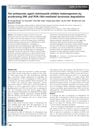 January 2020 in “Elsevier eBooks”
January 2020 in “Elsevier eBooks” Plant-based chemicals may help hair growth and prevent hair loss but need more research to compete with current treatments.
 April 2019 in “Journal of Investigative Dermatology”
April 2019 in “Journal of Investigative Dermatology” Differences in growth factors in platelet-rich plasma therapy for hair loss can vary between patients and can be influenced by the devices used, possibly leading to inconsistent results.
 April 2018 in “Journal of Investigative Dermatology”
April 2018 in “Journal of Investigative Dermatology” STIM1 is essential for sweat secretion.
 April 2018 in “The journal of investigative dermatology/Journal of investigative dermatology”
April 2018 in “The journal of investigative dermatology/Journal of investigative dermatology” Ginseng and Albizia extracts may help prevent age-related hair thinning.
 January 2018 in “Springer eBooks”
January 2018 in “Springer eBooks” Lasers are less favored for hair transplant surgery but show promise for hair growth in controlled trials.
 September 2017 in “Journal of Investigative Dermatology”
September 2017 in “Journal of Investigative Dermatology” The Siah1 and Siah2 genes are active in mouse skin development and hair growth, especially right after birth.
 May 2016 in “Research opinions in animal & veterinary sciences”
May 2016 in “Research opinions in animal & veterinary sciences” Maternal aspartame consumption during pregnancy leads to skin damage and higher apoptosis in newborn rat offspring.
Avicennia Marina extract and avicequinone C can reduce hair loss hormone production and increase hair growth factors, suggesting they could be used to treat androgenic alopecia.

Chrysanthemum zawadskii extract may help treat hair loss by promoting hair growth and affecting growth factors.
 January 2023 in “Open veterinary journal”
January 2023 in “Open veterinary journal” Cow blood vessel cell secretions helped heal rat burn wounds and may treat burns and hair loss.
 April 2018 in “Journal of Investigative Dermatology”
April 2018 in “Journal of Investigative Dermatology” Topical tofacitinib is effective in promoting hair growth for non-scarring alopecia.

Tissue from dog stem cells helped grow hair in mice.
 June 2014 in “Journal of biomedical research”
June 2014 in “Journal of biomedical research” Sargassum fusiforme extracts help promote hair growth.

Avicennia marina extract and avicequinone C can potentially promote hair growth and treat hair loss by interfering with hair loss mechanisms and boosting growth factors.
 277 citations,
June 2003 in “The journal of investigative dermatology. Symposium proceedings/The Journal of investigative dermatology symposium proceedings”
277 citations,
June 2003 in “The journal of investigative dermatology. Symposium proceedings/The Journal of investigative dermatology symposium proceedings” Epithelial-mesenchymal interactions control hair growth cycles through specific molecular signals.
 155 citations,
August 2003 in “Journal Of Experimental Zoology Part B: Molecular And Developmental Evolution”
155 citations,
August 2003 in “Journal Of Experimental Zoology Part B: Molecular And Developmental Evolution” Understanding hair growth involves complex interactions between molecules and could help treat hair disorders.
 124 citations,
October 2019 in “Frontiers in Immunology”
124 citations,
October 2019 in “Frontiers in Immunology” Janus kinase inhibitors are promising treatments for autoimmune skin diseases like eczema and psoriasis.
 68 citations,
June 2005 in “Expert Opinion on Therapeutic Targets”
68 citations,
June 2005 in “Expert Opinion on Therapeutic Targets” Oestrogens help maintain healthy skin, heal wounds, and may protect against skin aging and cancer.
 66 citations,
January 2000 in “Hormone Research in Paediatrics”
66 citations,
January 2000 in “Hormone Research in Paediatrics” Androgens can both promote and prevent hair growth due to differences in gene expression in hair follicles.
 48 citations,
March 2019 in “Frontiers in Physiology”
48 citations,
March 2019 in “Frontiers in Physiology” Wounds on the face usually heal with scars, but understanding how some wounds heal without scars could lead to better treatments.
 18 citations,
December 2018 in “Expert Opinion on Biological Therapy”
18 citations,
December 2018 in “Expert Opinion on Biological Therapy” Hair follicle stem cells are promising for wound healing but require more research for safe clinical use.
 15 citations,
March 2015 in “Experimental Dermatology”
15 citations,
March 2015 in “Experimental Dermatology” Clotrimazole, an antifungal cream, may safely reduce skin pigmentation by breaking down the enzyme needed for making melanin.
 13 citations,
September 2020 in “International Journal of Molecular Sciences”
13 citations,
September 2020 in “International Journal of Molecular Sciences” PRP therapy and minoxidil combo works best for male hair loss.
 12 citations,
July 2021 in “Scientific Reports”
12 citations,
July 2021 in “Scientific Reports” Glutamic acid helps increase hair growth in mice.
 10 citations,
June 2016 in “Wound Repair and Regeneration”
10 citations,
June 2016 in “Wound Repair and Regeneration” The microenvironment, especially mechanical forces, plays a crucial role in hair growth and could lead to new treatments for hair loss.
 7 citations,
January 2019 in “Annals of dermatology/Annals of Dermatology”
7 citations,
January 2019 in “Annals of dermatology/Annals of Dermatology” Synthetic ceramides may help hair growth by boosting cell growth in hair follicles.
 3 citations,
December 2022 in “Nutrients”
3 citations,
December 2022 in “Nutrients” Limonin from young citrus fruits may help with hair growth by affecting cell growth and hair cycle pathways.
 2 citations,
August 2020 in “Scientific reports”
2 citations,
August 2020 in “Scientific reports” Genes related to keratin, skin cell differentiation, and immune functions are key in hedgehog skin and spine development.
 August 2024 in “International Journal of Basic & Clinical Pharmacology”
August 2024 in “International Journal of Basic & Clinical Pharmacology” Secretome-based therapies could improve hair growth better than current treatments.
 July 2021 in “IntechOpen eBooks”
July 2021 in “IntechOpen eBooks” Ginseng, especially its component ginsenosides, can promote hair growth, reduce hair loss, and potentially treat conditions like alopecia by affecting cell pathways and cytokines.





























